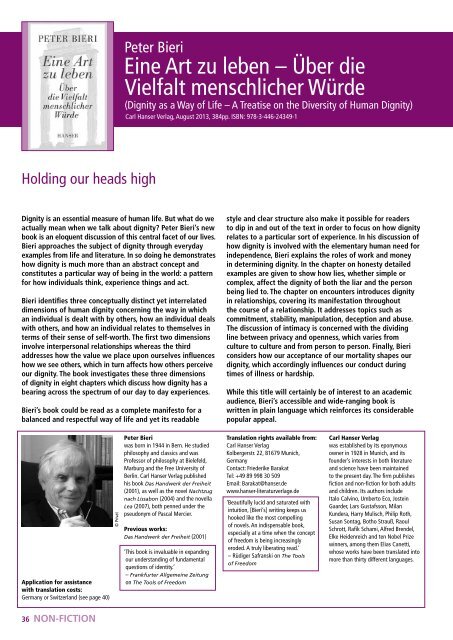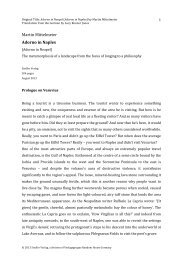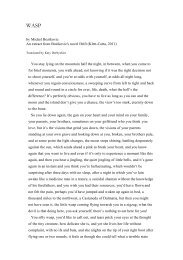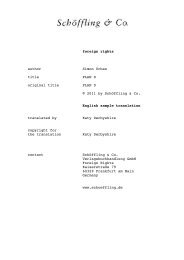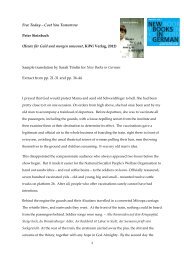issue 34 - New Books in German
issue 34 - New Books in German
issue 34 - New Books in German
Create successful ePaper yourself
Turn your PDF publications into a flip-book with our unique Google optimized e-Paper software.
Peter Bieri<br />
E<strong>in</strong>e Art zu leben – Über die<br />
Vielfalt menschlicher Würde<br />
(Dignity as a Way of Life – A Treatise on the Diversity of Human Dignity)<br />
Carl Hanser Verlag, August 2013, 384pp. ISBN: 978-3-446-24<strong>34</strong>9-1<br />
Hold<strong>in</strong>g our heads high<br />
Dignity is an essential measure of human life. But what do we<br />
actually mean when we talk about dignity? Peter Bieri’s new<br />
book is an eloquent discussion of this central facet of our lives.<br />
Bieri approaches the subject of dignity through everyday<br />
examples from life and literature. In so do<strong>in</strong>g he demonstrates<br />
how dignity is much more than an abstract concept and<br />
constitutes a particular way of be<strong>in</strong>g <strong>in</strong> the world: a pattern<br />
for how <strong>in</strong>dividuals th<strong>in</strong>k, experience th<strong>in</strong>gs and act.<br />
Bieri identifies three conceptually dist<strong>in</strong>ct yet <strong>in</strong>terrelated<br />
dimensions of human dignity concern<strong>in</strong>g the way <strong>in</strong> which<br />
an <strong>in</strong>dividual is dealt with by others, how an <strong>in</strong>dividual deals<br />
with others, and how an <strong>in</strong>dividual relates to themselves <strong>in</strong><br />
terms of their sense of self-worth. The first two dimensions<br />
<strong>in</strong>volve <strong>in</strong>terpersonal relationships whereas the third<br />
addresses how the value we place upon ourselves <strong>in</strong>fluences<br />
how we see others, which <strong>in</strong> turn affects how others perceive<br />
our dignity. The book <strong>in</strong>vestigates these three dimensions<br />
of dignity <strong>in</strong> eight chapters which discuss how dignity has a<br />
bear<strong>in</strong>g across the spectrum of our day to day experiences.<br />
Bieri’s book could be read as a complete manifesto for a<br />
balanced and respectful way of life and yet its readable<br />
style and clear structure also make it possible for readers<br />
to dip <strong>in</strong> and out of the text <strong>in</strong> order to focus on how dignity<br />
relates to a particular sort of experience. In his discussion of<br />
how dignity is <strong>in</strong>volved with the elementary human need for<br />
<strong>in</strong>dependence, Bieri expla<strong>in</strong>s the roles of work and money<br />
<strong>in</strong> determ<strong>in</strong><strong>in</strong>g dignity. In the chapter on honesty detailed<br />
examples are given to show how lies, whether simple or<br />
complex, affect the dignity of both the liar and the person<br />
be<strong>in</strong>g lied to. The chapter on encounters <strong>in</strong>troduces dignity<br />
<strong>in</strong> relationships, cover<strong>in</strong>g its manifestation throughout<br />
the course of a relationship. It addresses topics such as<br />
commitment, stability, manipulation, deception and abuse.<br />
The discussion of <strong>in</strong>timacy is concerned with the divid<strong>in</strong>g<br />
l<strong>in</strong>e between privacy and openness, which varies from<br />
culture to culture and from person to person. F<strong>in</strong>ally, Bieri<br />
considers how our acceptance of our mortality shapes our<br />
dignity, which accord<strong>in</strong>gly <strong>in</strong>fluences our conduct dur<strong>in</strong>g<br />
times of illness or hardship.<br />
While this title will certa<strong>in</strong>ly be of <strong>in</strong>terest to an academic<br />
audience, Bieri’s accessible and wide-rang<strong>in</strong>g book is<br />
written <strong>in</strong> pla<strong>in</strong> language which re<strong>in</strong>forces its considerable<br />
popular appeal.<br />
Application for assistance<br />
with translation costs:<br />
<strong>German</strong>y or Switzerland (see page 40)<br />
© Privat<br />
Peter Bieri<br />
was born <strong>in</strong> 1944 <strong>in</strong> Bern. He studied<br />
philosophy and classics and was<br />
Professor of philosophy at Bielefeld,<br />
Marburg and the Free University of<br />
Berl<strong>in</strong>. Carl Hanser Verlag published<br />
his book Das Handwerk der Freiheit<br />
(2001), as well as the novel Nachtzug<br />
nach Lissabon (2004) and the novella<br />
Lea (2007), both penned under the<br />
pseudonym of Pascal Mercier.<br />
Previous works:<br />
Das Handwerk der Freiheit (2001)<br />
‘This book is <strong>in</strong>valuable <strong>in</strong> expand<strong>in</strong>g<br />
our understand<strong>in</strong>g of fundamental<br />
questions of identity.’<br />
– Frankfurter Allgeme<strong>in</strong>e Zeitung<br />
on The Tools of Freedom<br />
Translation rights available from:<br />
Carl Hanser Verlag<br />
Kolbergerstr. 22, 81679 Munich,<br />
<strong>German</strong>y<br />
Contact: Friederike Barakat<br />
Tel: +49 89 998 30 509<br />
Email: Barakat@hanser.de<br />
www.hanser-literaturverlage.de<br />
‘Beautifully lucid and saturated with<br />
<strong>in</strong>tuition, [Bieri’s] writ<strong>in</strong>g keeps us<br />
hooked like the most compell<strong>in</strong>g<br />
of novels. An <strong>in</strong>dispensable book,<br />
especially at a time when the concept<br />
of freedom is be<strong>in</strong>g <strong>in</strong>creas<strong>in</strong>gly<br />
eroded. A truly liberat<strong>in</strong>g read.’<br />
– Rüdiger Safranski on The Tools<br />
of Freedom<br />
Carl Hanser Verlag<br />
was established by its eponymous<br />
owner <strong>in</strong> 1928 <strong>in</strong> Munich, and its<br />
founder’s <strong>in</strong>terests <strong>in</strong> both literature<br />
and science have been ma<strong>in</strong>ta<strong>in</strong>ed<br />
to the present day. The firm publishes<br />
fiction and non-fiction for both adults<br />
and children. Its authors <strong>in</strong>clude<br />
Italo Calv<strong>in</strong>o, Umberto Eco, Joste<strong>in</strong><br />
Gaarder, Lars Gustafsson, Milan<br />
Kundera, Harry Mulisch, Philip Roth,<br />
Susan Sontag, Botho Strauß, Raoul<br />
Schrott, Rafik Schami, Alfred Brendel,<br />
Elke Heidenreich and ten Nobel Prize<br />
w<strong>in</strong>ners, among them Elias Canetti,<br />
whose works have been translated <strong>in</strong>to<br />
more than thirty different languages.<br />
36 NON-Fiction


